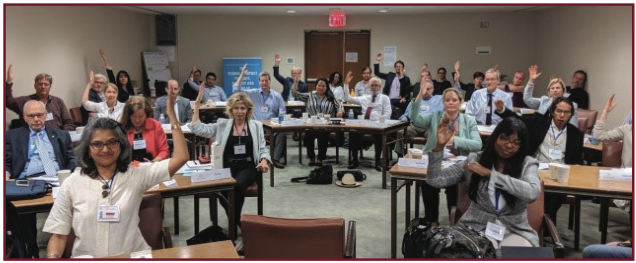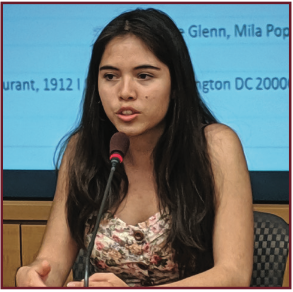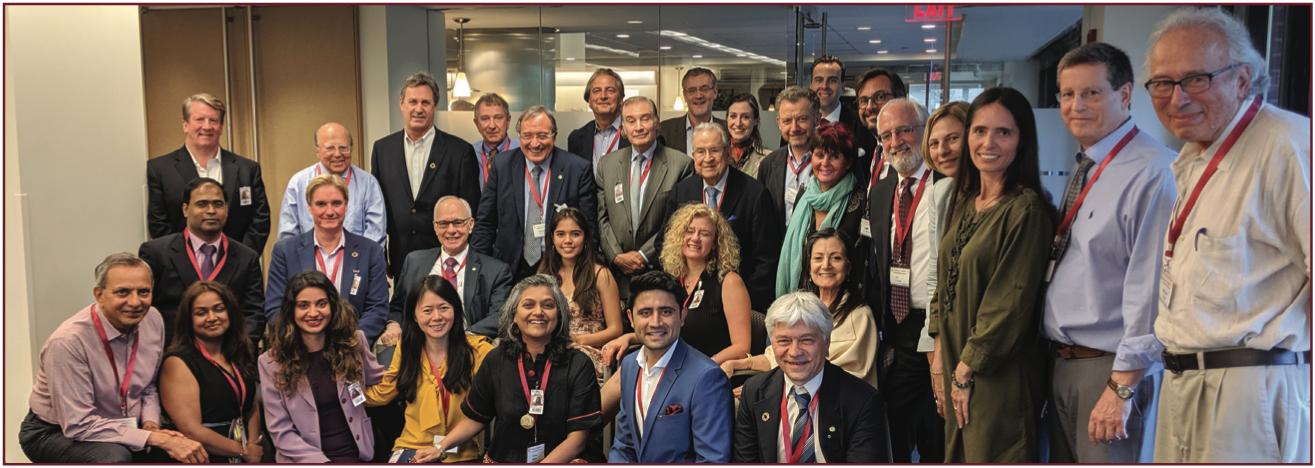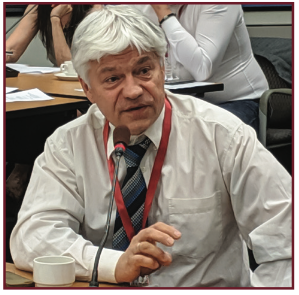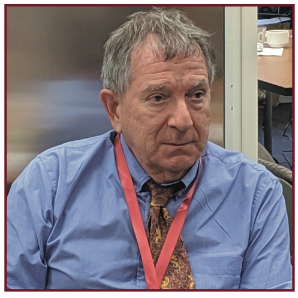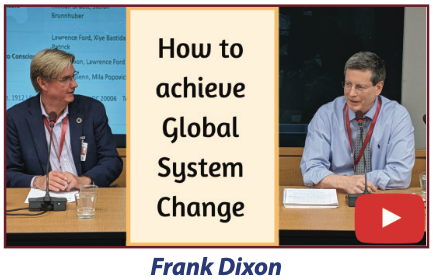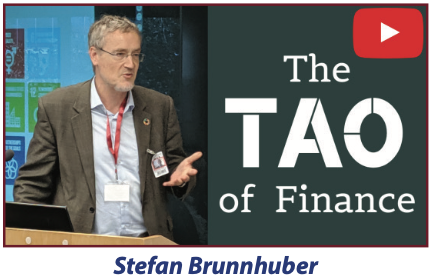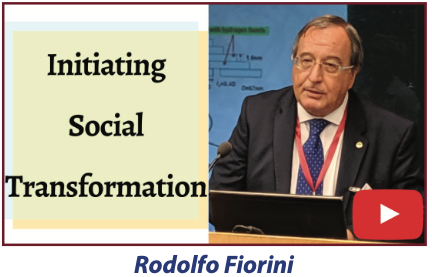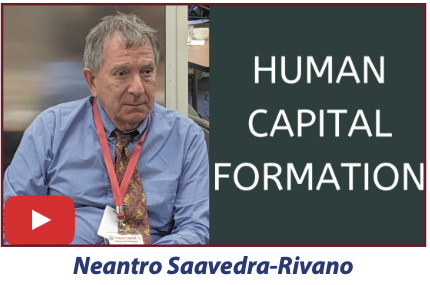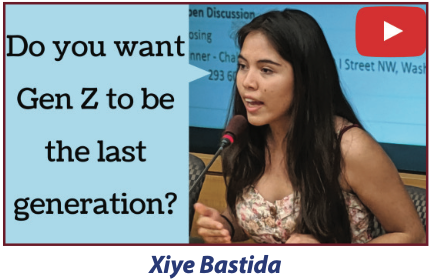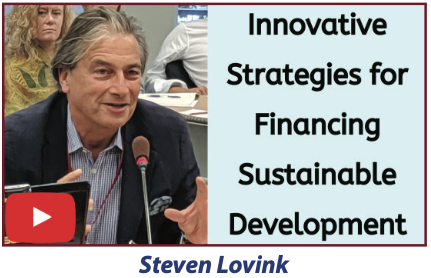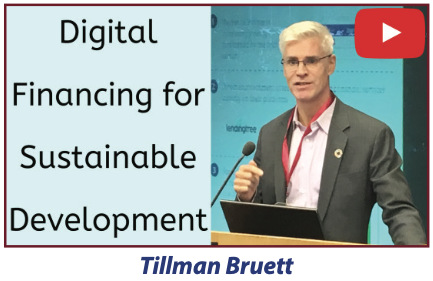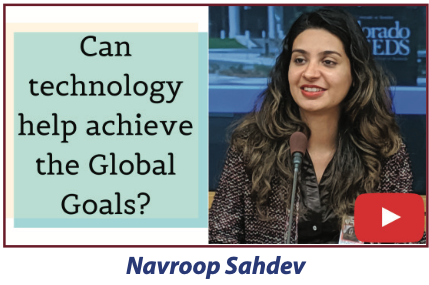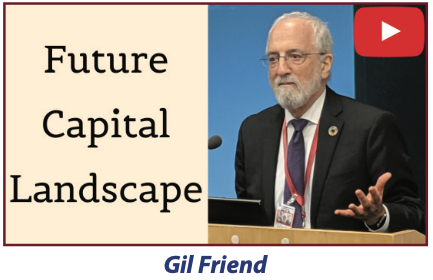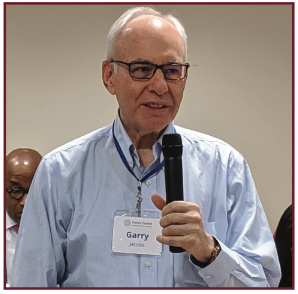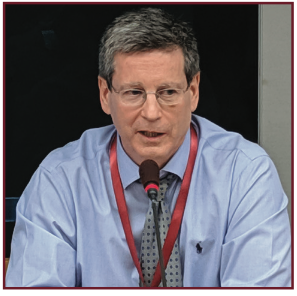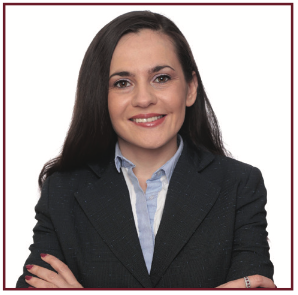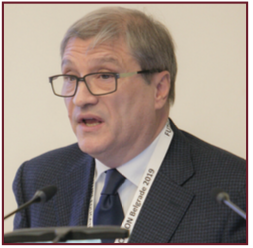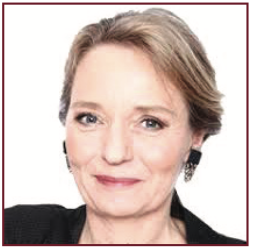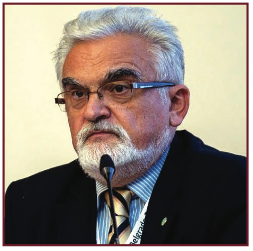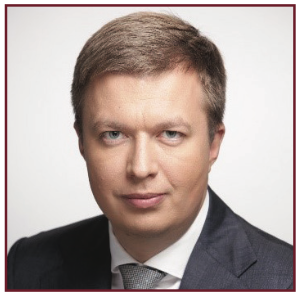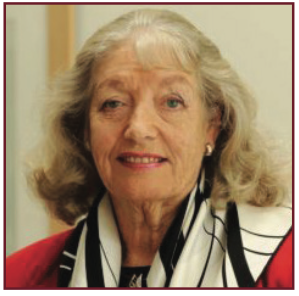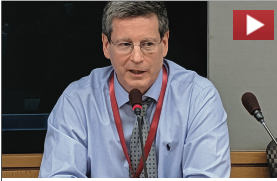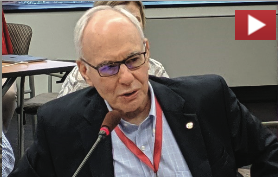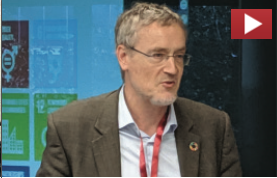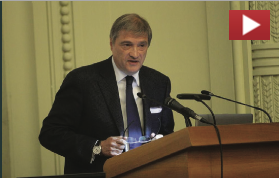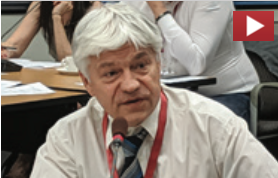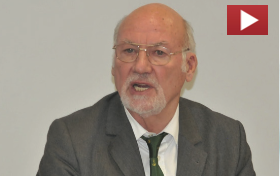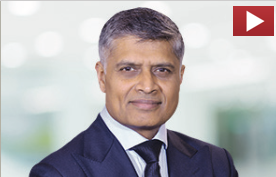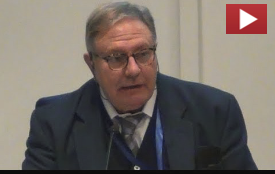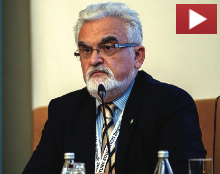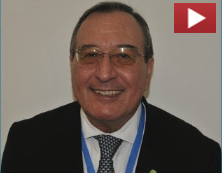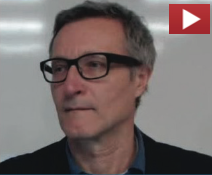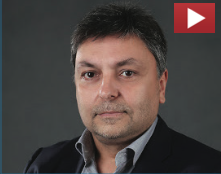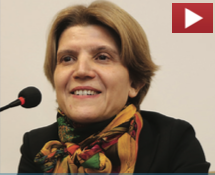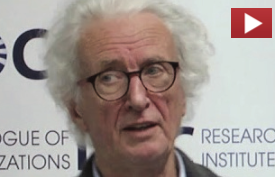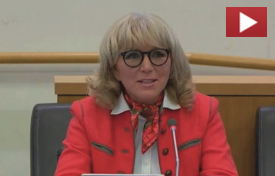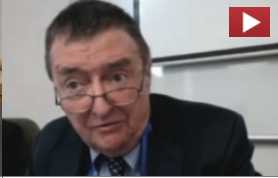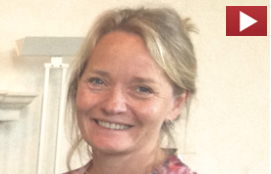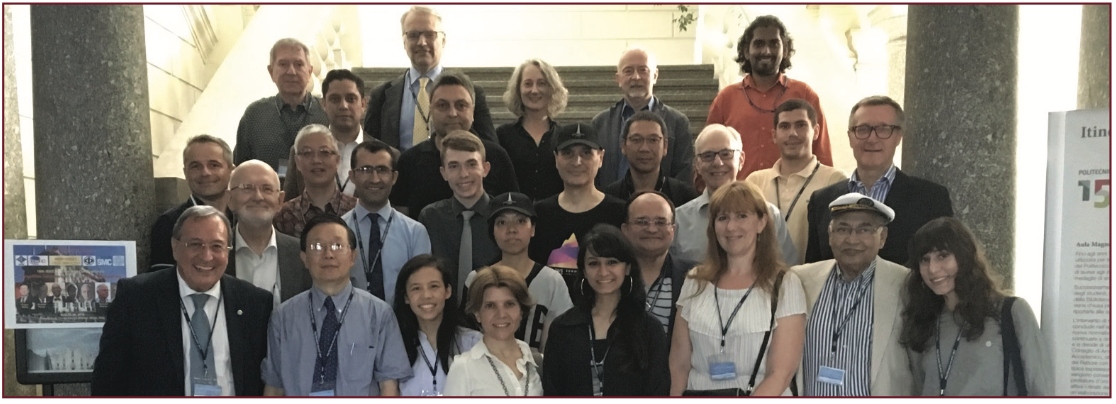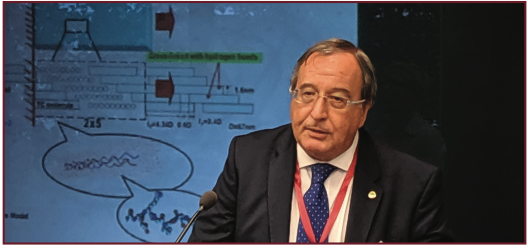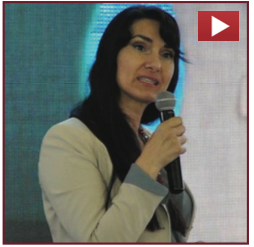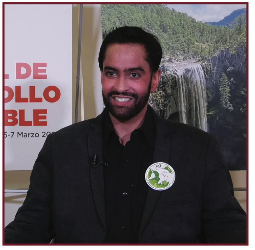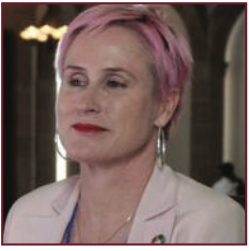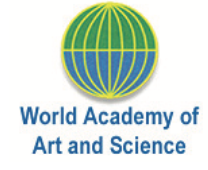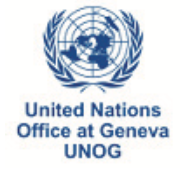| Click here for PDF version | ||||||||||||||||||

Global Leadership in the 21st century
|
||||||||||||||||||
|
What will it take to fill the global leadership vacuum that presently prevents humanity from addressing pressing existential challenges and emerging opportunities? What can we learn from radical transitions in the past about effective strategies for accelerating global social evolution? What is the role of international agencies, governments, businesses, universities, academies, research institutes and youth groups in overcoming ignorance, vested interests, political and bureaucratic obstacles to unleashing global social movements to support transition to a new paradigm for human development? These and similar questions are the subject of the project jointly launched by WAAS and the United Nations Office at Geneva (UNOG) in June 2019 to accelerate progress on pressing challenges and emerging opportunities, and accelerate implementation of the SDGs. This multi-stakeholder, multi-sectoral project will culminate in a major conference at UNOG on October 27-28, 2020 on the occasion of the UN’s 75th anniversary celebration, followed by a final report to the UN, development of university level courses and media outreach strategies. In November 2019 WAAS conducted two executive briefings at UNOG for UN agencies, UN member states and leading international NGOs. In December the Academy launched an online survey of these agencies and other collaborating partners in order to identify fundamental principles and effective strategies that can be applied to consciously accelerate the process of global social transformation. |
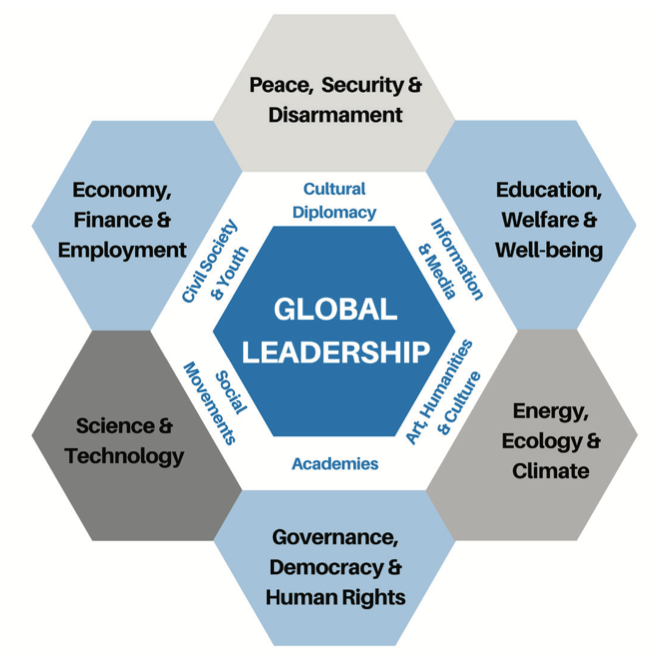
WAAS is collaborating with a host of partner organizations committed to accelerating social transformation at the global level. On March 5-7, 2020, it participated in the 2nd World Sustainable Development Forum (WSDF) at Durango, Mexico and announced partnership with WSDF and the Protect Our Planet (POP) Movement. A meeting with 35 representatives of international youth groups, including Fridays for the Future, enabled WAAS to enlist the active participation of youth groups in GL-21. |
|||||||||||||||||
|
GLOBAL LEADERSHIP IN THE 21ST CENTURY |
PARTNERSHIP BETWEEN IPCGE & WAAS THE TAO OF FINANCE INITIATIVE OF WAAS WORLD FUTURE DAY 2020 THE 6TH ALTIUS CONFERENCE, OXFORD UPCOMING EVENTS The World between Yesterday & Tomorrow, Podgorica Online: Consciousness, the Corporate World & Conflict Online: Global Issues & Future of Humankind FROM THE WAAS ARCHIVES |
|||||||||||||||||
 |
||||||||||||||||||
|
On March 9, WAAS and Club of Rome conducted a five hour online teleconference with participants from four continents on the Catalytic Strategies for Social Transformation, after the physical meeting at Dubrovnik was cancelled due to the Coronavirus threat. WAAS’ role in the Global Baku Forum scheduled for March 12-15 is being rescheduled to later in the year. In the coming months, WAAS will be partnering with other organizations to conduct other preparatory conferences:
|
|
|||||||||||||||||
|
Thus far more than 20 leading organizations have joined as partners in the GL-21 Project, including:
In late January 2020, WAAS constituted 14 expert working groups to conduct research and prepare position papers on the major themes of the GL-21 project, including both WAAS Fellows and distinguished members of partner organizations. The groups are intended to explore the potential for applying innovative transformational strategies to accelerate progress at the local, national and global level. The working groups will conduct research and prepare reports for preparatory conferences, the main UNOG conference, the report to the UN and other follow up actions. One set of groups relates to major global challenges, another set relates to some crosscutting strategies and resources that can be harnessed to accelerate progress on the issues.
Detailed information regarding the GL-21 project can be found on the WAAS website along with videos of the executive briefings, concept notes, discussion papers, and information on the GL-21 working groups. Those interested in contributing to the working groups are invited to write to global-leadership@worldacademy.org. |
||||||||||||||||||
  |
||||||||||||||||||
|
As part of WAAS’ initiative in the field of money, finance and economics, it is partnering with the Future Capital Initiative (FCI), a group of global thought and action leaders drawn from business and finance, arts and sciences, academia, and world wisdom traditions. FCI seeks to activate the power at the nexus of human values, consciousness and capital to mobilize investment capital |
as a creative force to accelerate global social transformation that promotes human wellbeing.
A principal objective of FCI is to support and accelerate existing transformation initiatives while also identifying and promoting new and emergent initiatives aimed at improving the quality and speed of implementation of the UN SDGs. |
|||||||||||||||||
Future Capital Inaugural Meeting: UN Headquarters, New York
|
||||||||||||||||||
|
The inaugural gathering of 50 founding members of the Future Capital Initiative was held at the United Nations in New York, September 12–13, 2019, in collaboration with WAAS, the UN Office for Partnerships, and the United Nations Conference on Trade and Development (UNCTAD). The inaugural meeting was convened by the Chairman of FCI, Lawrence Ford, recently nominated as Fellow of WAAS, and 13 other members of the FCI Design Team, which includes Garry Jacobs, Frank Dixon and Mila Popovich. The Founder’s Report contains a statement of objectives, principles and a list of Design Team and founding FCI members.
The New York conference was quickly followed by two WAAS-organized events at World Bank in Washington the following week and Inter-University Centre, Dubrovnik in November 2019, the Global Leaders Forum at Seoul later that month and the World Sustainable Development Forum in Mexico in early March 2020. These meetings are preparatory to an FCI summit at the UN |
in New York on September 10-11, 2020, in which 200 financial experts, socially-conscious investment advisers, and others strongly committed to conscious use of capital for human wellbeing. The aim of the summit will be to expand the network of participating individuals and organizations and build momentum for a social movement to redirect the world’s financial resources to implement the SDGs and accelerate change toward an inclusive, equitable and sustainable global financial system.
FCI is also one of more than 20 WAAS partners on the Academy’s project with the UN in Geneva on Global Leadership in the 21st century. FCI will present findings, conclusions and recommendations on global financial transformation at the Geneva Conference scheduled for October 27-28, 2020. In order to capitalize on the insights drawn from these meetings and the vast experience of its founding members, FCI has also created a number of working groups in which WAAS is actively collaborating on core issues related to development investing and impact measurement, support and accelerate the implementation of the SDGs, raise the level of consciousness of business and political leaders, and transform global education. WAAS’ partnership with FCI and other catalytic initiatives to follow are part of its on-going effort to promote integrated, value-based, human-centered new economic theory and policy at the global level. |
|||||||||||||||||
The Value, Purpose and Future of Money
Roundtable on Financing Global Development at the World Bank |
||||||||||||||||||
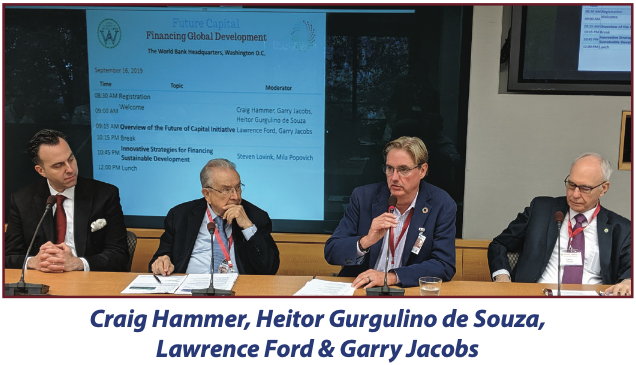
On September 16-17, 2019, WAAS and FCI co-organized a roundtable at the World Bank headquarters in Washington D.C., to explore ideas and practical strategies to enhance the effective use of money, financial markets and other forms of capital to address the climate crisis, the implementation of the SDGs and to achieve other objectives that promote the equitable improvement of human well-being at a global level. The meeting was hosted by Craig Hammer, WAAS Associate Fellow and Program Manager and Secretary of Development Data Council, The World Bank, USA.
The participants focused on the need for large scale system change initiatives that can have impact at the community, national and global level, and on strategies to generate widespread public support for a self-multiplying movement for conscious capital. Xiye Bastida, a US leader of the Fridays for Future global youth movement led by Greta Thunberg, addressed the meeting to present the views of the next generation on the urgent importance of action. Money is a form and symbol of social power. Money has human, psychological and social roots in society. The exchange rates, purchasing power parity, taxation rates and the GDP are superficial metrics of the economy. The roots go deeper. There is something more fundamental underlying our financial system, economy, and society. During the |
heydays of the Roaring 20s leading up to the Great Crash and Great Depression, the power of money was hijacked for speculative gain, leading to unprecedented levels of inequality. The New Deal fundamentally altered the foundations of the financial system to reorient it to support the broader well-being of the American population.
Once again today, we find an economy serving the few driven by financialization and globalization and fostering unsustainable levels of inequality and economic insecurity. A clear understanding of the nature of money is needed to empower this unique human invention for global welfare and wellbeing. The world possesses all the financial resources needed to meet our material needs and foster wellbeing. But the global monetary and financial system misconstrues its fundamental purpose and role in society and is underperforming and mis-performing its intended role. A new financial paradigm is needed based on a fundamental change in consciousness and values. Money is a fundamental social force. It is too complex to be fully understood as a specialized topic in Economics. Over the past two decades WAAS has conducted numerous events examining money as a social institution from the perspective of social value systems, the evolution of social power, human accomplishment and wellbeing. The World Bank roundtable brought together a multidisciplinary group of thinkers to explore fundamental questions regarding the foundations and creation of money, financing the implementation of the 17 SDGs, and practical strategies to enhance the effective use of money, financial markets and other forms of capital to promote equitable development and wellbeing for all. The World Bank event was part of a series of conferences and roundtables to look at the nature of money and identify ways to transform the global financial system to better serve human needs. Collaboration with FCI is an attempt to translate the knowledge gained into an effective instrument for action with real social impact. |
|||||||||||||||||
|
|
||||||||||||||||||
Initiating Social Transformation
Global transformation requires cooperation across numerous socio-cultural and political boundaries. Money or capital is concentrated social power, and how it is used is of vital importance for the success or failure of a society. It is possible to initiate systemic change from the finance sector, because of its outstanding influence on human affairs. The phenomenal expansion of the sustainable investment market and growing realisation that a shift to sustainable investment is imperative for survival are encouraging trends. They illustrate the power of new models for driving socially and ecologically positive sustainable development. |
Financing Human Capital Formation
In today’s world where ideas create most value, the knowledge and abilities embedded in people are indispensable to generate development. The human capital deficit of developing countries is a consequence of the inability of most families to provide for the basic needs of their offspring. These countries are thus deprived of a large portion of their potential for development. This situation can be dealt with by the innovative use of financial markets and financial instruments to support human capital formation. |
|||||||||||||||||
Presentations at the Roundtable on Financing Global Development
|
||||||||||||||||||
Roundtable on the Social Foundations of Money: Dubrovnik, Croatia
Continuing its collaboration with Future Capital Initiative, WAAS hosted a roundtable discussion at the Inter- University Centre, Dubrovnik, Croatia on November 18-20, 2019 to explore the psychological and social foundations of money, the financial linkage between economic and political equality, and the utilization of money as an instrument for either concentration of power or the wellbeing of all. Money as a Social Institution
|
||||||||||||||||||
Transforming the Future of Money
There are enough resources to meet all human needs. But inequitable distribution leaves billions of people unable to meet basic needs. The functioning of the monetary system is a primary driver of inequality and unsustainability. To achieve sustainability and achieve the SDGs, the structured purpose of the monetary system must be to maximize the long-term well-being of humanity. No major part of the economic/financial system can be changed in isolation. All major aspects of society are connected, and therefore must be addressed through whole system approaches. |
Technology for Effective
|
|||||||||||||||||
|
||||||||||||||||||
A Global Currency
How can we create new forms of global money connected to real social capital? The world needs new ideas about global money. The virtual currency Nimses, made in Ukraine is one such idea. Nimses allows one to create, record, save and accumulate one’s time in its digital equivalent. There are 7.7 billion people living on earth today. The average life expectancy of a person is 587 thousand hours. If 1 hour is 1 = nim, then the world GDP is about 4,500 trillion nims. Human life time is an asset that is not subject to devaluation. The idea of Nimses currency is literal and clear to every inhabitant of the Earth: time is money! Transforming the Future of Money
Hazel Henderson is the founder of Ethical Markets Media, and a futurist, evolutionary economist, author, and consultant on sustainable development. She participated in the WAAS roundtables via webinar. View her presentation on ‘Transforming the Future of Money’. Ethical Markets Media is an independent media company promoting the emergence of a sustainable, green, more ethical and just economy worldwide. Visit ‘ethicalmarkets.com’ for more articles and videos on the subject. One such video is the feature-length documentary ‘The Money Fix’. It explores our society’s relationship with the dollar and examines economic patterning in both the human and the natural worlds. It documents alternative money systems which help solve economic problems for the communities in which they operate. |
||||||||||||||||||
Presentations at the Roundtable on Future of Money
|
||||||||||||||||||

Symbiotic System Science with Emphasis on
|
||||||||||||||||||
|
WAAS is facilitating the development of a new field of Symbiotic System Science to promote the development and application of advanced technologies in a harmonious manner that supports human-centric economic and social growth and wellbeing. It is based on the premise that this objective can best be achieved by reconceptualization of human-machine relations and a reconsideration of the appropriate role of regulation in the development and application of technologies. Technology is an instrument of human invention designed to enhance rather than marginalize or replace human functioning. Its proper role is as a supplement and complement to the development of human capacities and enhance the exercise of humanity’s unique abilities for value judgement, innovation, and creativity. Optimal results can |
only be achieved when the rightful role and contribution of both human and machine ‘intelligence’ are fully understood and the central role of human beings in value-based judgments and decisions is respected rather than supplanted by purely mechanical and mathematical processes.
The impact which technological innovation and adoption can have on society is too great to be left purely to the forces of technological innovation or commercial motive, any more than in professions such as medicine and law. The project will examine the role of regulatory quality across government, adopting key tools of regulatory policy, such as stakeholder engagement processes and regulatory impact assessment. The aim is to develop fundamental concepts of a Human-Centered Symbiotic System Science. |
|||||||||||||||||
Cognition, Society, Wellbeing |
||||||||||||||||||
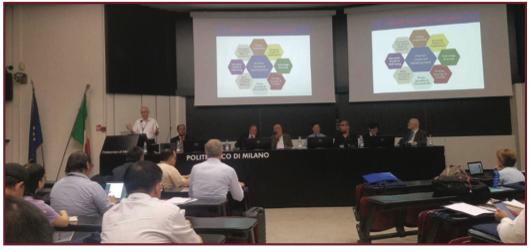
With this aim, WAAS participated in the 18th International Conference on Cognitive Informatics and Cognitive Computing (IEEE ICCI*CC 2019) held at Politecnico di Milano University, Italy on July 23-25, 2019, a conference series mainly devoted to Cognitive Informatics (CI) and Cognitive Computing (CC). CI and CC are transdisciplinary fields which synergize theories of modern information science, computer science, communication theories, AI, cybernetics, computational intelligence, cognitive science, intelligence science, neuropsychology, brain science, systems science, software science, knowledge science, cognitive robots, cognitive linguistics, and life science. They also promote novel applications in cognitive computers, cognitive communications, computational intelligence, cognitive robots, cognitive systems, and the AI, IT, and software industries. IEEE ICCI*CC 2019 focused on the theme of Cognitive Learning Systems, Brain-Inspired Systems, Cognitive Robotics, and, for the first time, on Art & Science. The conference hosted the WAAS CSW (Cognition-Society-Wellbeing) Workshop on Symbiotic Sciences and Arts. WAAS Fellows comprised a third of the total conference participants and presenters, extending the scope of the conference to examine the economic, educational, social, legal, political, cultural, epistemological and psychological implications of rapid advances in artificial intelligence and machine learning. |
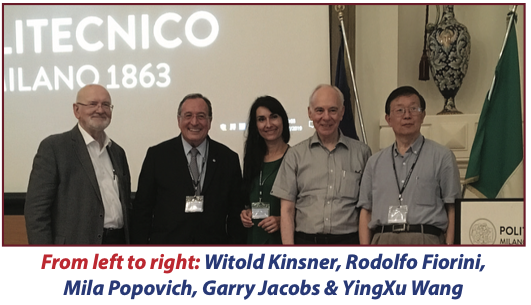
This stream combined with the Cyber-Physical-Technical track of IEEE resulted in fruitful, reciprocal knowledge and cognitive cross-fertilization from the two complementary lines of human thinking. WAAS’ contributions to the conference focused on topics such as AI and man-machine symbiotic societies; evolution of machine learning & social transformation; education in the era of intelligent machines; thinking, creativity & symbiotic systems; and cognitive technologies & social responsibility. IEEE ICCI*CC 2019 exposed participants to new ideas and concepts from highly talented, technically and socially-oriented professionals and academicians for a better mutual understanding of transformative changes that will impact global society in the near future. It was a successful opportunity for WAAS to develop strong links with IEEE representatives and position itself to better understand and equip itself to cope with the mutually strengthening and overlapping trends of the “computerization” of the world and its “digital transformation”. For further information and a full list of WAAS papers, click here. |
|||||||||||||||||
Systems, Man, and Cybernetics
|
||||||||||||||||||

Engaging Youth in our Efforts to Tackle Climate Change |
||||||||||||||||||
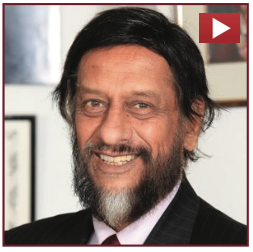
The World Academy continues its successful partnership with World Sustainable Development Forum (WSDF) and honors the service and legacy of its Founder, At the WSDF 2020 held in Durango, Mexico on March 5-7, 2020, WAAS presented its project on “Global Leadership in the 21st Century” (GL21) and invited WSDF and its youth movement counterpart PoP (Protect Our Planet) to continue our collaboration on the UNOG-WAAS project and initiative. The presentation on GL21 generated great interest among the participants in an unequivocal confirmation of the need for new leadership and resulted in many inquiries about ways in which individual experts, leaders, activists and their organization can contribute and become partners. WSDF 2020 was hosted by the government of Durango and supported by the officials of the government of Mexico. It featured 25 present and former heads of states and governments, participation from 27 world countries and over 700 adult delegates and over 1200 youth. It was Rajendra K. Pachauri who first recognized, honored and nurtured leadership of youth ever since the first WSDF in 2018 by featuring young leaders and their initiatives, dedicating entire plenaries and panels to showcasing youth, and reserving a whole day of conferencing solely for and with youth. WSDF 2020 reaffirmed their serious commitment to supporting youth and their leadership by having the program of the Forum led and facilitated by two accomplished teenage leaders. The Forum showcased true integration of inter-sectoral, inter-generational, and cross-regional leadership by |
having every plenary panel include at least two young leaders.
With focus on the voices of youth and supporting their initiatives, WSDF 2020 hosted a special GL21 consultative meeting with the youth: “WAAS–WSDF–POP Movement Special Meeting on Youth Leadership” on March 5th. The special meeting involved 35 participants including WAAS Fellow Peta Milan and was facilitated by Mila Popovich, GL21 Head of Research and Development, and Ash Pachauri, Founder of the PoP Movement. At the insightful meeting, youth organizations and their leaders shared their practices, challenges and strategies, and visions for the future. The meeting was so engaging that the participants asked to continue the deep exploration of proposed solutions and possibilities for supportive collaborations. WAAS is planning a follow-up online meeting to keep the group engaged and get them connected to the larger network of partners organized by the GL21 Youth Working Group. We want to take this opportunity to remember and honor the life work of Rajendra K. Pachauri and to express our support for the leadership of Ash Pachauri who will continue to lead and develop WSDF and PoP and our productive partnership. |
|||||||||||||||||
UN-WAAS PROJECT
Global Leadership SurveyWe seek to learn from successful leadership initiatives of the past in order to devise and refine more effective strategies for the global community to advance on humanity’s urgent priorities. Please share your valuable experiences so that all can benefit. Click here to access the survey form. |
||||||||||||||||||

Turning Swords into Ploughshares
|
||||||||||||||||||
|
Goal 16 of the UN SDGs, which calls for the promotion of peaceful and inclusive societies for sustainable development, is the precondition for the accomplishment of all the other goals set forth in the SDGs. Education for a culture of peace is the basis for promoting peaceful and inclusive societies for sustainable development. The Inter-Parliamentary Coalition for Global Ethics (IPCGE), and its partners, including WAAS, have launched a major initiative to create a global steering committee of parliamentarians, religious, education and cultural representatives to lead the efforts to harness cultural |
and religious ethics to promote legislation and social action to implement these goals. It has encouraged the Levant Initiative for Global Peace to promote mandatory education for a culture of peace and SDGs as a security issue which constitutes the first line of defence to combat violent extremism, racism, xenophobia, hate speech, anti- semitism and terrorism. | |||||||||||||||||
Developing a Culture of Peace and Implementing
|
||||||||||||||||||
|
The first event in IPCGE’s efforts to promote mandatory education on a culture of peace and the SDGs took place at the UN Headquarters under the patronage of Federico Mayor, former UNESCO Director General and WAAS Fellow. Participants were invited to sign and publicize the petition on the website of Fundación Cultura de Paz, founded and directed by Federico Mayor. The event hosted by the mission of Bulgaria to the UN included a session on “The Multi Track Partnership of Religious Leaders, Educators and the Media in Putting the |
Legislation into Action” which was co-chaired by Alberto Zucconi.
The conclusion of the event featured the goal for implementation of SDG 16 by the end of the International Decade for Rapprochement of Cultures ending in 2022. WAAS and the World University Consortium (WUC) support their partnership with IPCGE to reach this goal through the compilation of a model curriculum proposal which will be at the disposal of parliamentarians, government officials, educators and private citizens around the globe. |
|||||||||||||||||
IPCGE and WAAS at the Council of Europe
|
||||||||||||||||||

The TAO of Finance Initiative of WAAS:
|
||||||||||||||||||
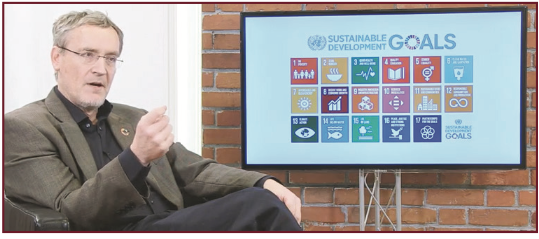
In 2015, world leaders signed up in New York for a future road map with 17 Sustainable Development Goals (SDGs) to improve Humanity, the Planet, Wealth, Peace and Partnerships. Most of these SDGs focus on common goods such as clean air, universal access to health care, education and maintaining biodiversity. These goods are not exclusive and should be accessible to and enjoyed by everyone. Each of these goals has enough scientific evidence, technological know-how and political consensus to be achieved, and is valid for the entire planet. But these goals are expensive to achieve and require a financial investment of approximately 5 trillion USD/year over the next 15-20 years. Such development needs have primarily been financed through private sector financing, conventional public sector funding and philanthropic commitment. These sources are |
not sufficient in scale and speed to meet the pressing financial needs. The world community is too busy repairing, stabilizing, and refunding the system to maintain the stability of the existing system. The introduction of a parallel electronic currency specifically designed to finance global commons, and a human-centred economy would provide the necessary resources to achieve the UN SDGs while stabilizing the existing monetary system. The development of cryptocurrencies based on blockchain distributed ledger technologies has prompted leading central banks around the world to study the potential application of this approach to directly inject purchasing power without dependence on the banking system. Proposals are now being studied by an international expert group on how this approach can be utilized to finance the huge multi-trillion dollar annual investment requirements for achieving the SDGs, with special emphasis on investments in human resources and environmental protection. A report of the WAAS expert group will be published in mid-2020. Click the links to watch the video recordings on How to Finance SDGs and Blockchain for a Sustainable Future. |
|||||||||||||||||

WAAS collaborates with Millennium Project on Global Futures Literacy |
||||||||||||||||||
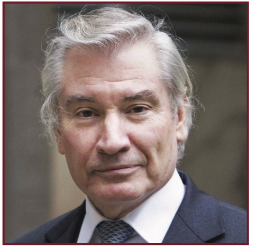
The World Academy partnered with the Millennium Project again this year for the marking of the World Future Day on March 1st. 24-Hour Round-the-World Conversation to celebrate World Future Day was hosted by Jerome Glenn, WAAS Fellow and Co-Founder and CEO of the Millennium Project, a global foresight participatory think thank represented by nodes in 66 countries worldwide. Joining the Millennium Project and the World Academy were renowned futures-focused organizations: The Association of Professional Futurists, Humanity+, UNESCO’s Global Futures Literacy Network, and the World Futures Studies Federation. For the past six years, global thought leaders have shared their views about governing artificial intelligence, inventing future employment, building space elevators to orbital cities, reducing climate change, guaranteeing safe water and energy, fighting transnational organized crime, developing future forms of democracy, countering information warfare, incorporating global ethics in decision-making, |
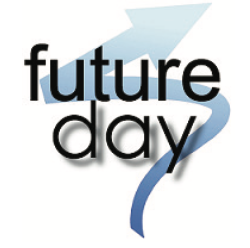 enforcing safety standards for synthetic biology, and the future of humanity. enforcing safety standards for synthetic biology, and the future of humanity.
This was the seventh year that futurists and the general public gathered online to discuss possible worlds of tomorrow in an open conversation. Futures research was shared, collaborations were created, and new friendships were made. World Future Day 2020 engaged many great minds on future challenges, foresight, and shared futures around the world beginning at 12 noon in New Zealand time and ending March 1st 12 noon in Hawaii time zone. World Future Day 2020 was joined by Vint Cerf, Internet Pioneer, who described the experience as thoroughly enjoyable. The most significant new feature of the World Future Day 2020 was the special round-the-world conversation with youth—new, parallel 24-hour track on discussing futures literacy, future preparedness and future-making with the youth. |
|||||||||||||||||

Organizing Society for the 21st Century
|
||||||||||||||||||
|
On October 4-6, 2019, the 6th Altius Conference gathered eminent scientists, politicians, social thinkers and students at the Oxford Union under the title “Organizing Society for the 21st Century”. After the initiative of Carlos Blanco and Alexandre Pérez Casares, co-founders of The Altius Society at Oxford, the event sought to analyze the future of the current systems of democratic participation through an interdisciplinary approach involving the natural sciences, the social sciences and the humanities. One of the key elements in the discussion was the importance of empowering citizens and enhancing critical thinking as tools for examining |
potential reformulations of the models of democratic participation and the redesign of the economic social contract. Among this year’s speakers were David Gross (Nobel laureate in Physics), Alain Touraine (eminent French sociologist), Sheldon Glashow (Nobel laureate in Physics), and WAAS Fellows Carlos Blanco, Piero Dominici, Garry Jacobs, and Ernst Ulrich von Weizsäcker. | |||||||||||||||||

International ConferenceThe World between Yesterday and TomorrowPodgorica, Montenegro (DATE TBC)Organized by the Montenegrin Academy of Sciences and Arts in collaboration with WAAS, European Academy of Sciences and Arts and the Global Round Table
|
||||||||||||||||||
|
Looking back at history can be seen as being stuck in the past, an activity that can be detrimental. Can we and should we forget all that has happened earlier? In truth, looking back to see forward is desirable and necessary. What is holding us from moving forward? Is it our tendency to understand life in hindsight? Should we not be prepared to take advantage of opportunities when they arise? While the past can provide a sense of security, it does not define the future. The future welcomes us with an incredible variety of choices. New knowledge accompanied by technology, mobility, climate change, globalization, and high |
urbanization results in great changes in human behaviour and environment, resulting in unpredictable changes in the future.
In a constantly changing world, it is not possible to move forward by mostly looking back and considering the past. At the same time, when we move forward, we step into the unknown. Do humans have the power to move forward without appreciating history? “The World between Yesterday and Tomorrow” will explore this subject. Visit the WAAS website for more details. |
|||||||||||||||||
LII CICA International Scientific Online ConferenceConsciousness, the Corporate World and Conflict:Towards a Deeper Understanding and Finding Solutions7-8 April 2020Organized by CICA International Foundation in collaboration with WAAS, Centre for Conscious Awareness Global, and Massey University, Albany, New Zealand
|
||||||||||||||||||
|
The corporate world is a sink of infinite possibilities where the challenge lies in making the right choices based on the right values and intentions. CICA International and its collaborators will address the topic of Consciousness and the Corporate World and attempt to understand the type of spiritual conflicts people have when joining the corporate world, unmask ethical issues and dilemmas involved in corporate undertakings, and suggest ways spirituality might help the corporate world find a new way forward. This encompasses understanding how different cultures and traditions make decisions and influence current thinking in various fields and how the transformation of consciousness is being realized in individuals and communities across the |
globe. Through these explorations, we hope to effectively reconcile the apparent conflict between the pursuit of profit and human and planetary wellbeing. Those interested in submitting a paper on the subject for publication in a journal are invited to write to consciousness@cicainternational.org.
President: J. Martin Ramirez (Nebrija University, Madrid, Spain); Scientific Organizer: Tina Lindhard (IUPS University, Hawaii, USA) For details about the program, please contact: |
|||||||||||||||||
Globalistics 2020: Global Issues & Future of HumankindSpecial Online Session, Lomonosov Moscow State University in collaboration with UNESCO, WAAS and the Club of Rome |
||||||||||||||||||
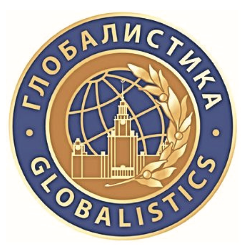
WAAS has been invited to organize a special session at Globalistics 2020 on the Process of Global Social Transformation in collaboration with Lomonosov Moscow State University (MSU), UNESCO and the Club of Rome (CoR). Globalistics 2020: Global Issues and Future of Humankind, the 6th International Scientific Congress that was scheduled to be held on May 18-23, 2020 at the University has been rescheduled to later in the year due to the Covid-19 pandemic. However, the special session that was to be part of the Congress will be held online. The session topics will include:
|
The joint project is expected to initiate a rich discussion among the participants from UNESCO, UNOG, WAAS, CoR, UNESCO Intergovernmental Council on Global Social Transformations and the scientific community. The online session, apart from facilitating an exchange of views, will also be an important act of solidarity in our effort to overcome current global threats. The session is tentatively scheduled for May 20th, the exact date will be confirmed shortly. The remaining sessions of the Congress will be held at Lomonosov Moscow State University when the global situation permits travel and the resumption of regular work. Those interested in participating in the online meeting are requested to register here. |
|||||||||||||||||
 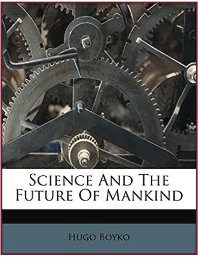 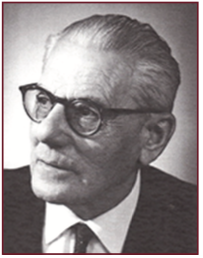
We have lived to see enormous social upheavals and developments in the course of the last few generations. Now is the time ripe that the main call should be: Scientists of all countries, unite! Create a forum which can be looked upon by mankind with trust, and which is able and willing to give advice, in all the most vital questions with objectivity and from the highest ethical level. I am deeply convinced that we may achieve by the combined effort of strong single forces, which are all of them pulling in the same direction, a resultant multiplied force of great effect and most valuable consequence. |
||||||||||||||||||


